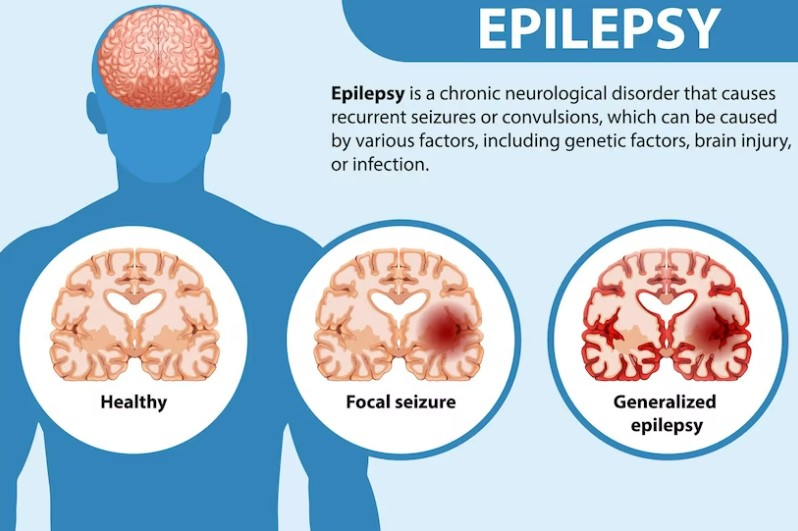
A chronic non-communicable brain disorder called epilepsy affects about 50 million people globally. It is distinguished by frequent seizures, which are brief bursts of spontaneous movement that can affect either a small region of the body (partial) or the full body (generalised). These seizures can occasionally be accompanied by a loss of awareness and control over bowel or bladder function. Epilepsy is the fourth most common neurological disorder in the world.
Recurrent seizures can occur if someone has epilepsy because of electrical activity spikes in their brain. Epilepsy does not cause all seizures. Although seizures may be caused by brain injury or a genetic predisposition, the actual cause is typically unknown.
What is Epilepsy?

Epilepsy can affect anyone, but it most commonly affects children and the elderly. Men are more likely than women to acquire epilepsy, probably as a result of higher exposure to risk factors such as alcohol consumption and head trauma.
What Causes Epilepsy?
Epilepsy cannot be spread. Though various underlying diseases can cause epilepsy, in roughly 50% of cases around the world, the disease's origin is still unknown. The following subcategories of causes of epilepsy exist: structural, genetic, infectious, metabolic, immunological, and unknown. Examples include:
-
Brain damage is caused by perinatal or foetal factors (such as low birth weight, delivery trauma, or oxygen deprivation during birth).
-
Brain deformities are caused by congenital anomalies or hereditary diseases.
-
Severe brain damage.
-
A stroke in which the flow of oxygen to the brain is restricted.
-
A brain infection, such as neurocysticercosis, encephalitis, or meningitis.
-
Certain genetic disorders.
-
A brain tumour.
Types of Seizures
The two main types of seizures include:
-
Generalized seizures
In this case, the entire brain is affected by generalised seizures.
-
Focal Seizures
Only one area of the brain is impacted by focal or partial seizures.
Symptoms of Epilepsy
The primary epilepsy symptom is seizures. The symptoms of a seizure vary from person to person and depend on the type.
Focal (partial) Seizures
They do not include any loss of consciousness involving symptoms such as:
-
Sense of taste, smell, sight, hearing, or touch changes.
-
Dizziness.
-
Tingling and twitching of limbs.
-
Complex partial seizures that are focally unaware include a loss of consciousness or awareness.
Additional signs include:
-
Staring blankly
-
No response
-
Performing repetitive movements
Generalized Seizures
The entire brain is involved in generalised seizures. Its subtypes include:
-
Absence Seizures
They frequently result in a brief loss of awareness, a blank stare, and occasionally repeated actions like blinking or lip-smacking.
-
Tonic Seizures
It includes symptoms such as sudden stiffness in your legs, arms, or trunk.
-
Atonic Seizures
It results in a loss of muscle control. Because a sudden loss of muscle power can cause one to fall quickly, they are also known as "drop seizures."
-
Clonic Seizures
Repeated, jerky muscular movements of the face, neck, and arms are signs of clonic seizures.
-
Myoclonic Seizures
Arms and legs twitch quickly and spontaneously as a result of myoclonic seizures. These seizures can occasionally group together.
- Tonic-Clonic Seizures
The symptoms include body stiffening, shaking, no bowel control or loss of bladder, tongue biting, and loss of consciousness.
Visit a neurology hospital if you are experiencing any of the above types of seizures.
Who is Affected by Epilepsy?
Anyone can acquire epilepsy, regardless of their age, ethnicity, or gender.
How is the Brain Affected by Epilepsy?
All parts of your body can communicate with and receive information from the cells in your brain. A constant electrical impulse that moves from cell to cell is used to transmit these messages. This periodic electrical impulse pattern is disturbed by epilepsy. Instead, there are electrical activity spikes between cells in one or more regions of the brain, much like an erratic lightning storm. This electrical disruption affects awareness (including loss of consciousness), sensations, emotions, and muscle actions.
Diagnosis of Epilepsy
The diagnosis tests include:
-
Electroencephalography (EEG)
This examination measures the electrical activity in your brain. Seizures are associated with specific aberrant electrical patterns.
-
Brain Scans
Magnetic Resonance Imaging (MRI) uses magnetic resonance imaging to detect anomalies in blood vessels, infections, and malignancies.
Management and Treatment of Epilepsy
Epilepsy can be controlled by:
-
Anti-seizure drugs.
-
Specific diets (sometimes in conjunction with anti-seizure drugs) such as the ketogenic diet and the modified Atkins diet are the most commonly recommended diets for people suffering from epilepsy.
-
Surgery and devices include stereotactic radiosurgery (targeted destruction of defective brain tissue), disconnection (cutting fibre bundles connecting sections of the brain), surgical resection (removal of abnormal tissue), or implantation of neuromodulator devices.
Prevention of Epilepsy
Despite the fact that many causes of epilepsy are uncontrollable and unavoidable, one can lessen their risk of getting some illnesses, such as:
-
Wearing a helmet when bicycling, keeping the floors free of debris and electrical cords to minimise falls, staying off ladders, and always wearing a seatbelt when driving reduces the risk of traumatic brain injury (from impacts to the head).
-
To reduce the risk of stroke, it is recommended to eat a balanced diet (such as the Mediterranean diet), maintain a healthy weight, and exercise frequently.
-
One should consult a therapist if they overuse drugs. The brain can suffer harm from alcohol and other illicit substances, which can result in epilepsy.





















 5 Min Read
5 Min Read















